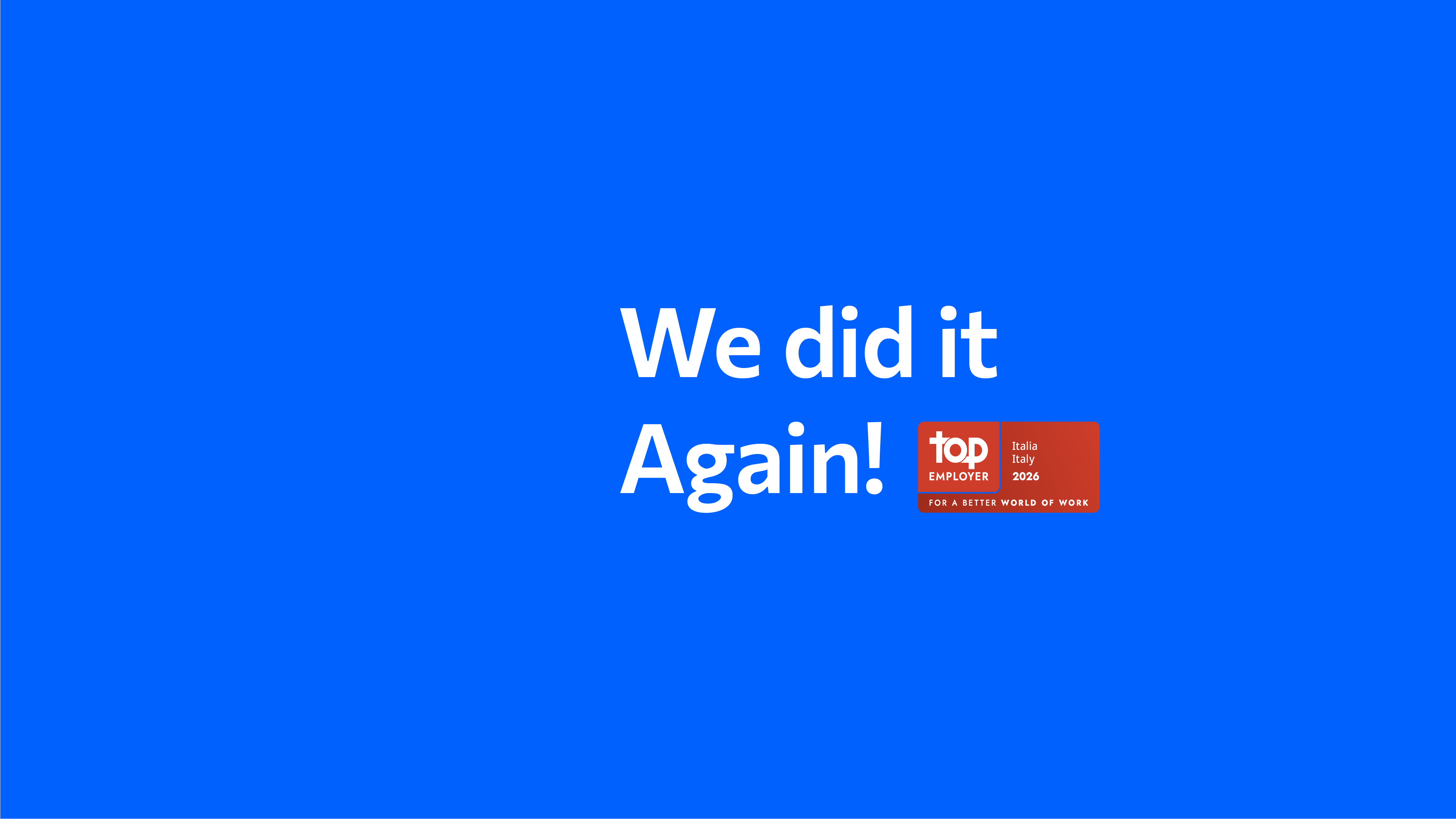Fluidity, vertical skills and investments in new technologies – according to Antonio Grillo that is what makes BU Digital
Antonio Grillo tells us about the characteristics and areas of competence of the mashfrog Group's Business Unit Digital, which he has been managing since 2017.

When and how did you come to Mashfrog?
I started my journey with Mashfrog through Robet (formerly Trustmyphone), a small innovative startup forged by the meeting of people like me, from academic backgrounds, and others who came from the world of digital entrepreneurship like Edoardo Narduzzi, Managing Director & President of the Mashfrog Group.
We followed our instincts to focus the entire offer on the area of mobile applications, a sector which in 2009 was still a rapidly growing technological frontier. When this line of business reached interesting volumes and Mashfrog felt the need to integrate it within its value proposition, we decided to bring these two entrepreneurial paths together by internalising those skills. So in 2017 I became responsible for Mashfrog's digital delivery; to the point where I am now the Head of the Digital Business Unit.
My academic career began with a master's degree in Computer Engineering followed by a PhD in Computer and Automation Engineering with a specialisation in mobile computing topics. I invested in building a set of specific skills, which came in very handy in supporting the creation of the company now known as Robet. Once I joined the company, I followed a growth path to continue to adapt my skills to new professional challenges. In 2019 Mashfrog decided to invest in my managerial training with a Master's Degree in Business Administration from Luiss; I followed this path with a lot of enthusiasm and with the aim of rounding out my profile with skills that could support my professional development. In my experience, continuous training was needed to face with complete awareness both the continuous changes in the context in which I operate and the new roles and consequently new responsibilities that I take on.
What are your business unit's areas of activity?
The Mashfrog's digital offer is structured into five distinct areas:
- front end solutions,
- software engineering,
- digital marketing & optimisation,
- digital communication,
- video production.
Each area is staffed by professionals who have the training and professional experience that is aligned with the skills that characterise the resources they coordinate; they have gained managerial skills over time, moving from the management of small groups of people to the management of projects up to receiving the task of coordinating a portion of the offer. I believe that this model characterised by internal growth paths contributes to guaranteeing the authority of those who hold managerial roles on the one hand and on the other hand stimulates an entrepreneurial attitude in each of the resources.
The five areas oversee the entire digital supply chain; we produce digital containers (mobile applications, websites and any other form of container we have today or will have in the future) but, unlike other players in our sector, we also deal with the production of digital contents, whether multimedia or textual, and their promotion by defining and executing multichannel marketing strategies. The Video area was most recently formalised. Over time, video production, already integrated in the Digital Communication area, has come to play an important role within the offer; therefore, we have strategically decided to promote the creation of a dedicated area. A few months ago, we acquired Alterawide – a company specialised in the production of video content, which allowed us to oversee a portion of the wide offer with which we present ourselves to the market in a structured format, making use of professionals who have a solid track record in the sector.
The five areas that make up BU Digital are like workout areas, where people with homogeneous skills work in close proximity; this close contact encourages the formation of beneficial mechanisms of cross-pollination that lead to the acquisition of new skills and healthy competition to ensure the continuous improvement of existing skills. The managers of the different areas work within the workout areas to ensure that these developments meet expectations both in terms of the market's resources and its current and future needs.
What values do the areas you manage have in common?
The differences between them are quite obvious; a new area arises when we perceive that some specific skills have reached a level of maturity that would benefit from being given a dedicated area. This separation guarantees autonomy throughout the supply chain: from the talent selection stages to those dealing with operational coordination and growth. The strong differentiation of the areas from a hard skills point of view, however, contrasts with significant homogeneity in terms of soft skills; the area managers, while applying appropriate solutions to the specific domain, share a common value approach that guides their daily choices. This alignment ensures that all mashfrog digital professionals, regardless of their technical skills, act as:
- Reliable guides, not just mere executors but real operational partners, who on a day-to-day basis work to reduce inefficiencies, optimise processes and redesign workflows to achieve their objectives.
- They are creative jugglers because they think and create products and solutions that amaze the customer's target audience; technology is not just a mixture of hardware and software, but rather it is an amplifier of emotions and a space for dialogue.
- They hunt for innovative solutions, try to offer customers constantly evolving expertise and actively contribute to their continuous research and development activities; this effort is needed in order to continue to stay at the forefront of innovation by governing change.
To protect this unified vision, albeit with a heterogeneous offer, an intermediate professional figure is positioned between me and the heads of the different areas, and that is Andrea Spadoni the Delivery Coordinator (DC). From the many responsibilities of his role, it is helpful to highlight two aspects: on the one hand, his continuous commitment to ensure that every initiative dedicated to the development of the workforce is designed and implemented in a manner consistent with the specific needs of the resources involved, but reaches a homogeneous result for the company; on the other hand, his fundamental contribution in coordinating the interpretation of the requests arriving from the market into a list of relevant activities for each area.
What roles exist in your unit?
It is very difficult to answer this question. In my opinion it is impossible to say how many professionals of a certain type you can field, because the concept of type is hard to apply. The areas actually welcome homogeneous roles but these cannot be captured by a single job description; even when, because of organisational needs, we assign the same job role to two professionals in an area, we entrust the task of keeping track of the skills profile that distinguishes each individual resource from others to the coordinators in charge.
The differentiation of skills has an enormous value that is consolidated by a number of factors: the training path, professional path, individual attitude and passions, involvement in certain project activities, training initiatives, ...
In fields like the one mashfrog operates in, which are rapidly expanding, there are always new resources entering the market, and each one of them introduces skills that significantly advance the workforce's professional skill set. Each resource can therefore be seen as a piece of a unique puzzle; it is the responsibility of the managers of each area to know and keep up to date the profile of each resource, in order to determine the best fit to meet operational needs.
Beyond the skills, each resource that becomes part of the workforce preserves a wealth of rules of engagement, operational flows, coordination tools, solutions for sharing objectives. In order to continuously improve the operating procedures to maximise efficiency and effectiveness, the area managers are encouraged to consider every possible source of information without blindly defending established customs, instead allowing good practices, even when they are not the result of endogenous growth, to discover fertile ground, so that these practices can spread rapidly within the workforce.
In conclusion, while designating job roles remains an organisational necessity, it also risks being limiting; it therefore makes more sense to speak of strong liquidity – the very same liquidity that allows us to promote the emergence, even within the same job role, of well-defined areas of competence. We choose to back those that prove to be the most promising because they may soon develop into a new area within delivery and thereby enrich our offer to the market.
Fluidity, evolution and change are the three qualities that best describe our work in the digital field and which are necessary prerequisites to remain competitive in the long run.
How many people work in your unit?
In my unit we now have more than 100 people, with a well-distributed seniority and an average age of around 30 years. Most professionals are individuals with about five years of professional experience; it would be superficial to mistake this lack of seniority for juniority, because in the domain in which we operate each resource has already undergone numerous changes. In fact, experience in this sector does not grow exclusively with the passing of time but receives decisive contributions from the technological discontinuities that frequently arise and which have to be dealt with. Presiding over today's technology, knowing which technologies are emerging and deducing which of these will become established and when this will happen, that's the secret to always remaining in the game, keeping one eye on the ball and the other on the current situation we are in.
On the one hand, we invest vertically in the specific skills of each area, on the other hand, when we create project teams, we stimulate and promote cross-pollination between different professional figures, who can interact and increase their soft skills by comparing themselves to colleagues from another area and consequently develop a critical understanding of how they are furthering their professional development.
Let's talk about customers: what are the most important projects you are pursuing right now?
We have several historical customers – among them I am pleased to mention Enel; in 2011 this was the client with whom I gained my first experience as a project manager. We currently manage their internal communication for them and have been doing so for several years. On this path we came across and got to know Alterawide with whom we immediately established a fruitful collaboration, which recently resulted in an acquisition. We are also very proud to have won several tenders in recent months, including the Open Fiber tender, the Infratel tender for the technological development of broadband infrastructures and the Enel X tender for the supply of editorial and publishing services for the Global Content Management and Communications Italy fields. I should emphasise here that some of these customers have been with us for many years, and the fact that at each tender we are able to reconfirm ourselves as solid and qualified partners demonstrates not only the trust that customers place in our work but also the quality of the services we offer. These are the characteristics that allow us to continue the projects we develop.
In conclusion, can you tell us something about the proprietary “make in mashfrog” platforms?
Since its inception, Mashfrog has always chosen to invest in innovative technological solutions through the development of proprietary platforms. We believe that this investment also has a high reputational value; we tell and show the market that we are able to meet its needs before they emerge, so as to become trusted as a company that is capable of not only creating but also of managing platforms in a context in which more and more products are becoming services to be provided via the platforms. Furthermore, by transforming projects into platforms, we can guarantee the company's stability in the medium and long term, while building something that naturally represents continuity over time.
Some of them were created within the company; others were acquired after their creation. This is the case with Miobenefit, a corporate welfare platform through which companies can provide a wide range of advantages and benefits to their employees. It was created externally within a small startup that orbited around mashfrog, and when it became mature and ready to be commercialised, it was internalised to equip it with the suitable structures to grow further and be adequately maintained for the needs of large customers, such as Poste Italiane, where it was put into operation. Miobenefit is not the only platform designed, created and marketed by mashfrog. The same is true for PressPal and Summi, which are proprietary solutions provided as part of Software as a Service (SaaS). PressPal is a solution designed to support our customers' press offices in the production of content that is consistent with their editorial lines and optimised for better use and greater dissemination via target channels through the use of Artificial Intelligence solutions. Summi, on the other hand, allows corporates to simplify the management of live events through tools that improve interaction opportunities for remote audiences by exploiting technologies that enable mixed reality.
We recently decided to transform Unit Digital's offering; until now we have focused on platforms created internally, but we are gradually starting to combine traditional skills with the ability to customise, integrate and manage market platforms. In fact, we believe that complementing the “make” offer with a “buy” offer is useful and necessary to firm up the company's solidity. A number of experiences feature in this context, including a partnership with the Zuora platform and the one with the BigCommerce platform.
More generally, mashfrog's resources who, along with me, are involved in defining our offer's strategic direction have generated a permanent observatory for platforms that are proving themselves in the various sectors, where we try to select those platforms from among the emerging options that best integrate with our strategies in terms of the development of our offer and skills.


